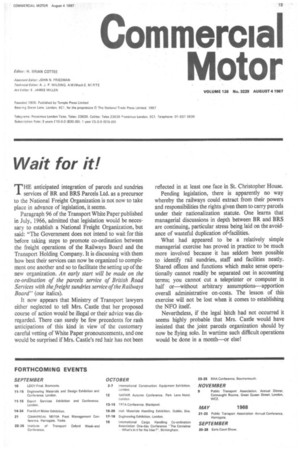Wait for it!
Page 21

If you've noticed an error in this article please click here to report it so we can fix it.
THE anticipated integration of parcels and sundries services of BR and BRS Parcels Ltd. as a precursor to the National Freight Organization is not now to take place in advance of legislation, it seems.
Paragraph 96 of the Transport White Paper published in July, 1966, admitted that legislation would be necessary to establish a National Freight Organization, but said: "The Government does not intend to wait for this before taking steps to promote co-ordination between the freight operations of the Railways Board and the Transport Holding Company. It is discussing with them how best their services can now be organized to complement one another and so to facilitate the setting up of the new organization. An early start will be made on the co-ordination of the parcels service of British Road Services with the freight sundries service of the Railways Board" (our italics).
It now appears that Ministry of Transport lawyers either neglected to tell Mrs. Castle that her proposed course of action would be illegal or their advice was disregarded. There can surely be few precedents for rash anticipations of this kind in view of the customary careful vetting of White Paper pronouncements, and one would be surprised if Mrs. Castle's red hair has not been reflected in at least one face in St. Christopher House.
Pending legislation, there is apparently no way whereby the railways could extract from their powers and responsibilities the rights given them to carry parcels under their nationalization statute. One learns that managerial discussions in depth between BR and BRS are continuing, particular stress being laid on the avoidance of wasteful duplication of-facilities.
What had appeared to be a relatively simple managerial exercise has proved in practice to be much more involved because it has seldom been possible to identify rail sundries, staff and facilities neatly. Shared offices and functions which make sense operationally cannot readily be separated out in accounting terms; you cannot cut a teleprinter or computer in half or—without arbitrary assumptions—apportion overall administrative on-costs. The lesson of this exercise will not be lost when it comes to establishing the NFO itself.
Nevertheless, if the legal hitch had not occurred it seems highly probable that Mrs. Castle would have insisted that the joint parcels organization should by now be flying solo. In wartime such difficult operations would be done in a month—or else!












































































































